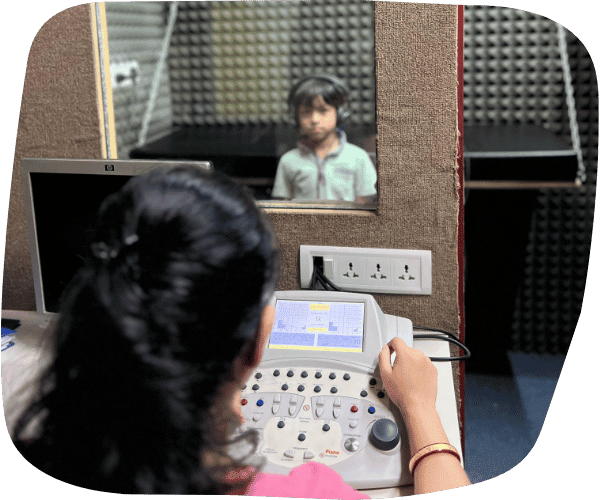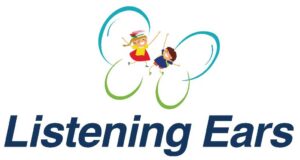Cochlear Implant
What is the minimum age for Cochlear implantation?
————————————————–
What is the candidacy for cochlear implant?
————————————————–
How long should therapy go after Cochlear implantation?
————————————————–
Does my child need speech therapy after Cochlear implant?
————————————————–
How long will it take for my child to start hearing and speaking properly?
————————————————–
What if my child isn’t responding to the therapy?
————————————————–
If you are looking for guidance or assessment, our team provides complete support for Cochlear Implant in Jasola, helping families understand the process clearly and confidently.
Hearing is just the first step—let us help your child listen, learn, and speak!
Our Expertise Areas
Post-Implant Switch-On and Mapping
Auditory-Verbal Therapy (AVT)
Speech and Language Development
Cognitive and Academic Support
Multidisciplinary Collaboration
Families living nearby can also visit our dedicated Cochlear Implant centre in Jasola, where expert professionals guide children through therapy, listening development, and long-term communication goals.
Cochlear Implant
0 - 6 Months
Listens to own voice
Maintains eye contact
Responds to sound by smiling, head turning, startling
Responds to loud sounds
Express self by vocalizationns
Discriminate angry & friendly vocal tones
6-12 Months
Starts to respond with vocalizations when called by name
Babbles Pa Pa, Ba Ba
Localizes sound source with accuracy
Longer attention span
Imitates physical actions
Appears to enjoy listening new words
1-2 Years
Understand more simple instrutions
Auditory memory of one item at the end of a phrase/sentence
Mostly vowels present
Mainly producing front consonants (p, m, n, h, w)
Consonants (k, e, t, n, g) emerging
Enjoys sounds making toys & objects
Frequently asks a questons
2-3 Years
Uses 2-3 word phrases more consistently
Uses some personal pronouns e.g. me, you
Consonants (f, y) emerging
Answers "wh" questions e.g. What's that? Who? What's doing?
Understands & answer "can you"?
Uses negative e.g. don't know
Whispers
4 Years
Starts to answer "what if?"
Relays a message
Uses "when" & "how many" question
Can listen to a 10-15 minute story
Understands more difficult concepts
Constants (j, v, th) emerging
Uses more appropriate loudness
Uses how much? How? questions
5 Years
Understands instructions using sequencing words First, Next & Last
Understands adjectives (soft, hard etc.)
Uses well framed sentences
Generally Co-operates with play mates
Understands time sequence like yesterday, today, and tomorrow
Follows longer directions, book
What to expect
✅ Skilled professionals guide your child’s journey.
✅ Personalized plans for your child’s unique needs.
✅ Comprehensive Services, from assessment to success, we’re with you every step of the way.
✅ Empowering parents with the tools to support their child at home.
✅ Proven track record of improving hearing and communication.
Let us help your child find their voice and thrive.
Contact us today to learn how we can support your child’s speech and language development.
For ongoing support, families can also access our Cochlear implant service in Jasola, which includes mapping, therapy, and continuous follow-up care.
FAQ's
So, my child has the implant now, but why is therapy so important? What will it do for them?
Think of the implant as giving your child the hardware to hear. Therapy is like the software and the training. It teaches their brain how to understand the new sounds, how to make sense of them, and how to use them to learn language and speech. It’s really crucial for them to get the full benefit of the implant.
When should we get started with the therapy? Is there a best time after the implant is activated?
The sooner, the better! We usually recommend starting therapy within a few weeks of the implant being activated. Getting started early gives your child the best chance to develop their listening and speaking skills.
How long will my child be in therapy? Is this something we'll be doing for years?
Every child is different, so there’s no one-size-fits-all answer. Most kids need therapy for at least a year or two, and some might benefit from ongoing support for a while longer. We’ll work with you to track your child’s progress and adjust the therapy as needed.
Will my child be able to talk right away once they get the implant?
Not immediately. The implant lets them hear sounds, but they need to learn what those sounds mean and how to use them to form words. It’s a process, and it takes time and practice. But with consistent therapy, you’ll definitely see progress.
Will my child be able to go to a regular school with the implant?
Absolutely! Many children with cochlear implants attend mainstream schools and do really well. Some might need a little extra support in the classroom, but they can definitely thrive in a regular learning environment.
Will the implant make my child's hearing just like anyone else's?
Cochlear implants is a very good option, but they don’t restore hearing to exactly the same level as someone with normal hearing. The sound is processed a little differently. However, with therapy and practice, kids with implants can develop really good listening and speaking skills, and communicate effectively just like other children.
How can I tell if the implant is working like it should? What signs should I look for?
You’ll start to notice things like your child responding to sounds, turning their head when they hear voices, or reacting to music. We’ll also do regular check-ups with the audiologist to make sure the device is working correctly. And, of course, we’ll be here to guide you and answer any questions you have along the way. We’ll help you understand what to look for and what’s normal.


